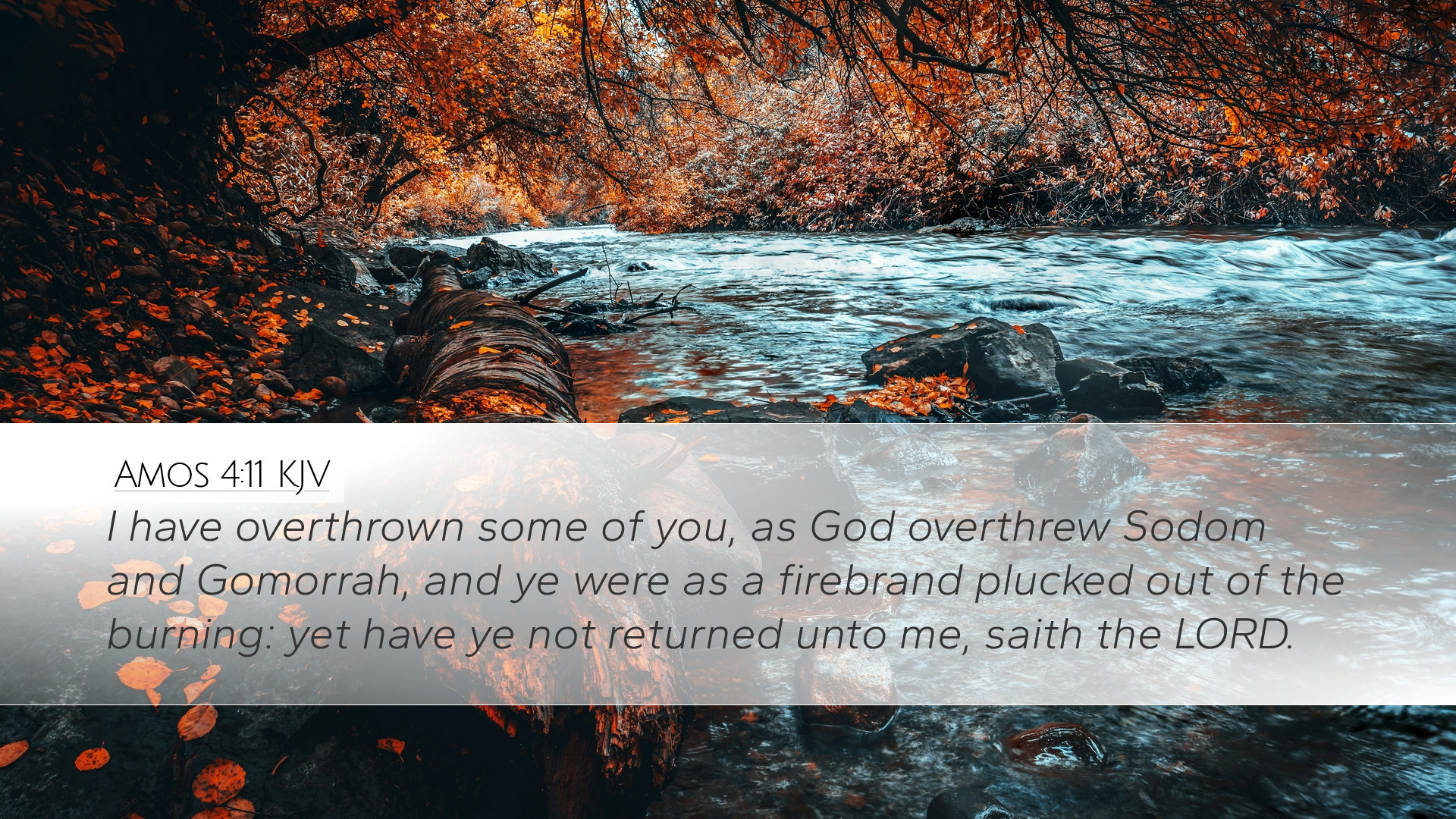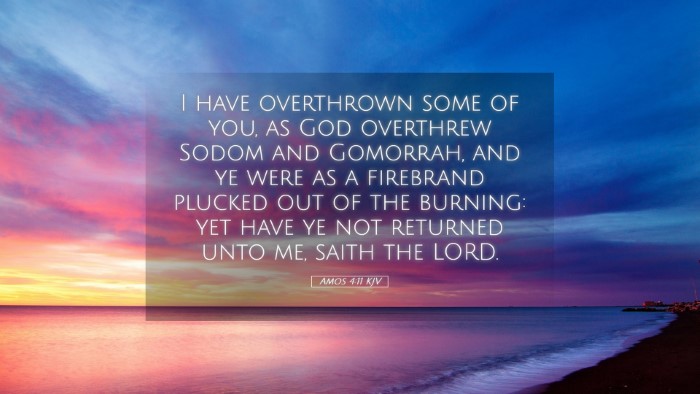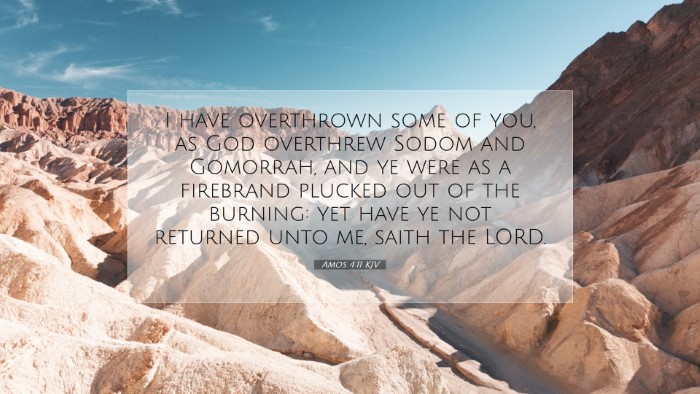Old Testament
Genesis Exodus Leviticus Numbers Deuteronomy Joshua Judges Ruth 1 Samuel 2 Samuel 1 Kings 2 Kings 1 Chronicles 2 Chronicles Ezra Nehemiah Esther Job Psalms Proverbs Ecclesiastes Song of Solomon Isaiah Jeremiah Lamentations Ezekiel Daniel Hosea Joel Amos Obadiah Jonah Micah Nahum Habakkuk Zephaniah Haggai Zechariah MalachiAmos 4:11
Amos 4:11 KJV
I have overthrown some of you, as God overthrew Sodom and Gomorrah, and ye were as a firebrand plucked out of the burning: yet have ye not returned unto me, saith the LORD.
Amos 4:11 Bible Commentary
Commentary on Amos 4:11
Amos 4:11 states: "I overthrew some of you, as God overthrew Sodom and Gomorrah, and you were as a firebrand plucked out of the burning: yet have ye not returned unto me, saith the Lord." This verse encapsulates God's judgment and His persistent call for repentance, emphasizing themes of divine sovereignty and mercy even amidst calamity.
Contextual Background
The verse is situated in the prophetic ministry of Amos during a period of great prosperity for Israel, which was paradoxically coupled with social injustice and moral decay. The context helps illuminate the severity of God's message through Amos, as the people were living in false security, neglecting spiritual and ethical obligations.
Exegesis and Analysis
In Amos 4:11, the prophet draws a stark comparison between the fate of Israel and that of Sodom and Gomorrah. This comparison serves multiple purposes:
- Judgment as a Theme: The reference to Sodom and Gomorrah signifies ultimate judgment. These cities were destroyed due to egregious sin, thus highlighting the severe consequences awaiting Israel if they continued in their ways.
- Divine Mercy: The expression "as a firebrand plucked out of the burning" suggests that God, in His mercy, has spared remnants from utter destruction. This signifies hope and indicates that there remains a possibility for repentance and restoration.
- Call to Repentance: The repetitive phrase "yet have ye not returned unto me" indicates a longing from God for His people to turn back to Him. Despite experiencing judgment, their hearts remained hardened.
Insights from Matthew Henry
Matthew Henry emphasizes the tragic irony of the situation: God had intervened to avert complete destruction, yet the people failed to recognize and respond to His grace. He notes that the "overthrow" signifies both physical calamity and spiritual need for renewal. Henry articulates that the "firebrand" symbolizes those who are close to destruction but experience a momentary reprieve, reinforcing God’s readiness to forgive if they turn back.
Insights from Albert Barnes
Albert Barnes delivers a poignant interpretation of "I overthrew some of you." He points out that this reflects historical events of calamity within Israel and serves as a warning against complacency. Barnes proposes that just as Sodom's sins led to their downfall, so too would Israel's sins lead them to similar judgment if not addressed through repentance. He accentuates the appeal of God’s enduring invitation for the people to return, which should compel them toward self-examination.
Insights from Adam Clarke
Adam Clarke expounds on the metaphor of a "firebrand" by discussing the nature of God's mercy. He views it as illustrative of God’s power to save despite great moral failures. Clarke underscores that Israel's experience of distress, akin to that of Sodom, was a gracious opportunity for returning to God. He notes that the ultimatum of divine judgment could foster positive outcomes if the people were to heed the warnings. Clarke combines this imagery with an emphasis on nurturing genuine spiritual repentance.
Theological Implications
The theological bedrock of this verse rests heavily on the interplay between divine judgment and grace. Here are essential theological insights:
- The Nature of God’s Justice: This verse solidifies the principle that God is just and will not overlook sin. However, it also introduces the idea of God’s willingness to engage with humanity for reconciliation.
- Sin and Consequences: It illustrates the connection between sin and judgment. Just as Sodom was overtaken by its rebellion, so Israel must confront and acknowledge its own transgressions.
- Grace and Repentance: The mercy shown in sparing a remnant serves as a vital reminder that, despite grave sin, God continuously beckons His people toward repentance.
Conclusion
Amos 4:11 serves as a dual reminder of the serious nature of sin and the profound nature of God’s grace. Pastors, students, theologians, and scholars can draw upon this verse to encourage profound reflection on personal and communal sinfulness, and the ever-present opportunity for return to God. Each commentary enhances our understanding of the intricate relationship between human failure and divine forgiveness, encouraging a faithful response to God’s call in our lives.


